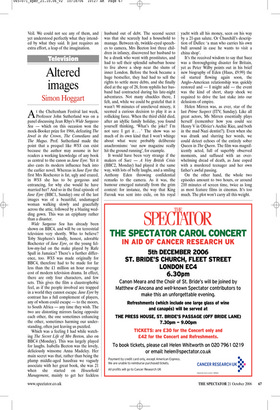Altered images
Simon Hoggart
At the Cheltenham Festival last week, Professor John Sutherland was on a panel discussing Jean Rhys’s Wide Sargasso Sea — which on this occasion won the mock-Booker prize for 1966, defeating The Jewel in the Crown, The Comedians and The Magus. Prof. Sutherland made the point that a prequel like WSS can exist because the author may assume in her readers a working knowledge of any book as central to the canon as Jane Eyre. Yet it also casts its modern influence back into the earlier novel. Whereas in Jane Eyre the first Mrs Rochester is fat, ugly and crazed, in WSS she has to be gorgeous and entrancing, for why else would he have married her? And so in the final episode of Jane Eyre (BBC1, Sunday) one of the last images was of a beautiful, undamaged woman walking slowly and gracefully across the attic, followed by a blazing wedding gown. This was an epiphany rather than a disaster.
Wide Sargasso Sea has already been shown on BBC4, and will be on terrestrial television very shortly. Who to believe? Toby Stephens’s kindly, honest, adorable Rochester of Jane Eyre, or the young fellow-my-lad on the make played by Rafe Spall in Jamaica? There’s a further difference, too. WSS was made originally for BBC4, therefore had to be made for far less than the £1 million an hour average cost of modern television drama. In effect, there are only four characters, and few sets. This gives the film a claustrophobic feel, as if the people involved are trapped in a world they cannot escape. Jane Eyre by contrast has a full complement of players, any of whom could escape — to the moors, to South Africa — any time they wish. The two are distorting mirrors facing opposite each other, the one sometimes enhancing the other, sometimes harming our understanding, often just leaving us puzzled.
Which was a feeling I had while watching The Secret Life of Mrs Beeton, also on BBC4 (Monday). This was largely played for laughs. Isabella Beeton was the lovely, deliciously winsome Anna Madeley. Her main secret was that, rather than being the plump middle-aged hausfrau we vaguely associate with her great book, she was 21 when she started on Household Management, mainly to get her feckless husband out of debt. The second secret was that she scarcely had a household to manage. Between sly, twinkle-eyed speeches to camera, Mrs Beeton lost three children in infancy, discovered her husband to be a drunk who went with prostitutes, and had to sell their splendid suburban house to live above a shop near the slums of inner London. Before the book became a huge bestseller, they had had to sell the rights to settle more debts, and she finally died at the age of 28, from syphilis her husband had contracted during his late-night adventures. Not many chuckles there, I felt, and, while we could be grateful that it wasn’t 90 minutes of unrelieved misery, it seemed a curious decision to play it as a rollicking farce. When the third child died, after an idyllic family holiday, you found yourself thinking, ‘What’s the joke? I’m not sure I get it ... ’ The show was so much of its own kind that I won’t whinge about what were probably deliberate anachronisms: ‘our new magazine really hit the ground running’, for example.
It would have been very strange if the makers of Suez — A Very British Crisis (BBC2, Monday) had played it the same way, with lots of belly laughs, and a smiling Anthony Eden throwing confidential remarks to the camera. As it was, the humour emerged naturally from the grim context: for instance, the way that King Farouk was sent into exile, on his royal yacht with all his money, seen on his way by a 21-gun salute. Or Churchill’s description of Dulles: ‘a man who carries his own bull around in case he wants to visit a china shop’.
It’s the received wisdom to say that Suez was a thoroughgoing disaster for Britain, yet as Peter Wilby points out in his brief new biography of Eden (Haus, £9.99) the oil started flowing again soon, the Anglo–American relationship was quickly restored and — I might add — the event was the kind of short, sharp shock we required to drive the last stake into our delusions of empire.
Helen Mirren was, as ever, star of the last Prime Suspect (ITV, Sunday). Like all great actors, Ms Mirren essentially plays herself (remember how you could see Henry V in Olivier’s Archie Rice, and both in the mad Nazi dentist?). Even when she was drunk and slurring her words, we could detect echoes of the entirely sober Queen in The Queen. The film was magnificently acted, full of superbly observed moments, and suffused with an overwhelming dread of death, as Jane coped with a murdered teenager and her own father’s awful passing.
On the other hand, the whole two episodes amount to two hours, or around 210 minutes of screen time, twice as long as most feature films in cinemas. It’s too much. The plot won’t carry all this weight.


































































































 Previous page
Previous page